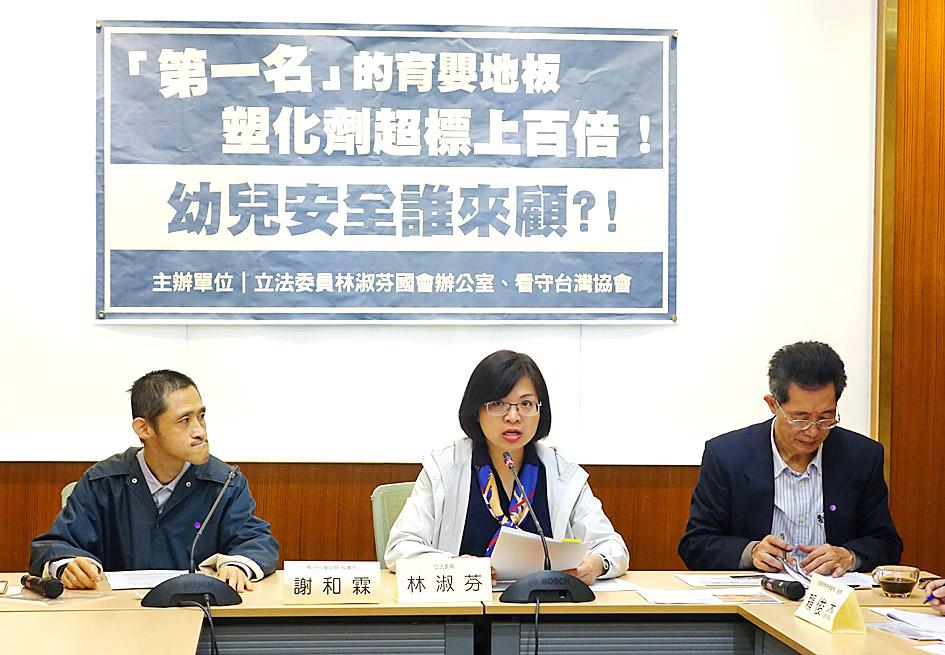Democratic Progressive Party Legislator Lin Shu-fen (林淑芬) on Tuesday expressed concern over plasticizer content in floor mats sold in Taiwan and urged the government to make inspections of such products mandatory.
Lin told a news conference in Taipei that she received complaints from people who said they suspected floor mats made in South Korea contained excessive amounts of plasticizer, as they have a strong smell of plastic.
Lin said that in August she asked the Bureau of Standards, Metrology and Inspections to inspect floor mats sold in Taiwan, several of which were found to contain excessive amounts of plasticizer.

Photo: Wang Yi-sung, Taipei Times
Taiwan has plasticizer standards for floor mats, but there are no regulations requiring inspections be conducted to ensure public safety, Lin said.
Floor mats are not covered by the Commodity Labeling Act (商品標示法), which requires companies to label the materials their products contain as a safety precaution, she said.
“It is not unusual for us to see babies crawling on plastic floor mats,” she added. “I am concerned that it could be harmful to them if they touch such hazardous floor mats over a long period.”
“However, in Taiwan, authorities have not imposed any mandatory inspections of [those] products,” Lin said.
She called on the bureau to regularly inspect floor mats sold in the nation.
Lin also asked the Department of Commerce to require that floor mats be labeled to better inform consumers about the chemicals contained in the products.
Bureau inspection section chief Lai Chun-chieh (賴俊杰) said that although inspections of floor mats are not mandatory, the Consumer Protection Act (消費者保護法) stipulates that vendors who design and manufacture such items must “ensure that their products comply with contemporary technical and professional standards with reasonably expected safety requirements.”
This means all products must meet legal standards, Lai said.
Vendors who fail to observe the requirements would be held accountable, according to the Consumer Protection Act, Lai added.

Three Taiwanese airlines have prohibited passengers from packing Bluetooth earbuds and their charger cases in checked luggage. EVA Air and Uni Air said that Bluetooth earbuds and charger cases are categorized as portable electronic devices, which should be switched off if they are placed in checked luggage based on international aviation safety regulations. They must not be in standby or sleep mode. However, as charging would continue when earbuds are placed in the charger cases, which would contravene international aviation regulations, their cases must be carried as hand luggage, they said. Tigerair Taiwan said that earbud charger cases are equipped

Foreign travelers entering Taiwan on a short layover via Taiwan Taoyuan International Airport are receiving NT$600 gift vouchers from yesterday, the Tourism Administration said, adding that it hopes the incentive would boost tourism consumption at the airport. The program, which allows travelers holding non-Taiwan passports who enter the country during a layover of up to 24 hours to claim a voucher, aims to promote attractions at the airport, the agency said in a statement on Friday. To participate, travelers must sign up on the campaign Web site, the agency said. They can then present their passport and boarding pass for their connecting international

Taiwan sweltered through its hottest October on record, the Central Weather Administration (CWA) said yesterday, the latest in a string of global temperature records. The main island endured its highest average temperature since 1950, CWA forecaster Liu Pei-teng said. Temperatures the world over have soared in recent years as human-induced climate change contributes to ever more erratic weather patterns. Taiwan’s average temperature was 27.381°C as of Thursday, Liu said. Liu said the average could slip 0.1°C by the end of yesterday, but it would still be higher than the previous record of 27.009°C in 2016. "The temperature only started lowering around Oct. 18 or 19

WEATHER Typhoon forming: CWA A tropical depression is expected to form into a typhoon as early as today, the Central Weather Administration (CWA) said yesterday, adding that the storm’s path remains uncertain. Before the weekend, it would move toward the Philippines, the agency said. Some time around Monday next week, it might reach a turning point, either veering north toward waters east of Taiwan or continuing westward across the Philippines, the CWA said. Meanwhile, the eye of Typhoon Kalmaegi was 1,310km south-southeast of Oluanpi (鵝鑾鼻), Taiwan’s southernmost point, as of 2am yesterday, it said. The storm is forecast to move through central